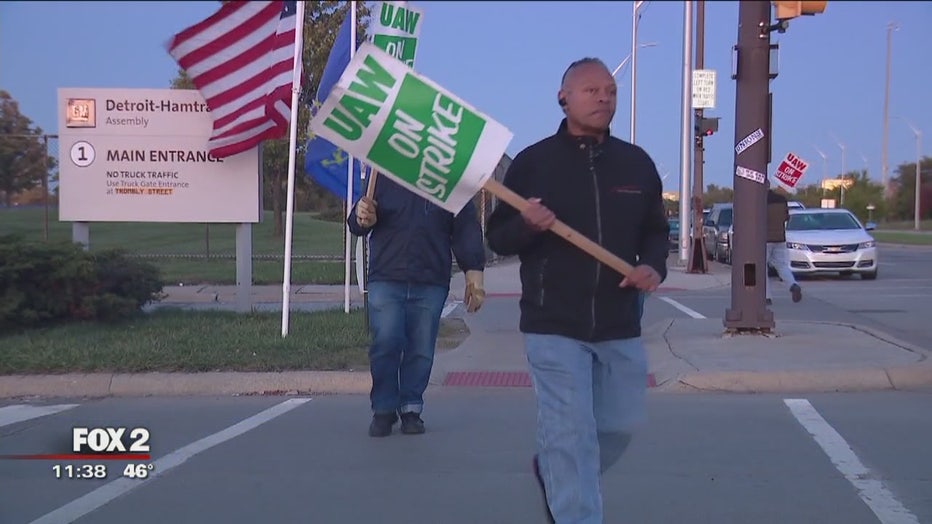UAW-GM Council sends tentative deal to membership, strike to continue until approved
DETROIT (FOX 2) - The UAW National GM Council has voted in favor of the tentative deal with General Motors, sending the vote now onto the entire membership Thursday afternoon. Though thousands of UAW workers will still be off the job as the union hasn't chosen just yet to end the strike.
UAW spokesman Brian Rothenberg addressed the media, saying the UAW GM Council has recommended accepting the tentative agreement, but that the strike will continue until it has been voted on by all members. The ratification meeting deadline is Oct. 25 for all votes to come in, with Rothenberg adding that he does not expect it to take long.
In past years, it's taken a minimum of three or four days and as long as several weeks for the vote to pass through the entire membership.
"They stood up for things they felt were important and continue to do so," he said. "Their leaders are incredibly grateful, I can tell you that from the meeting and incredibly, profoundly impacted by the overwhelming support from the community." he said. "This strike actually became more than just a strike for the UAW. it was about the hearts and minds of American workers in the middle class."
Rothenberg said under the new deal that there will be a three percent wage increase two years and four percent lump sum. The health plans will not change and added that the major negotiating point of full-time temporary workers will now have a "shorter path to permanent status." He added that less full-time temporary workers will be used under the proposed agreement.
The contract gives fulltime temprary workers a shortened path to permanent status and into a regular staus of a job and improves their paid and unpaid time off for temporary workers," he said. "We would hope that this contract once our workers weigh in, and they are the ultimate authority but regardless how this contract ends up, that this issue dealing with permanent temporary workers is the beginning of the end for perma-temps not only in this industry but in this nation."
Rothenberg said that there will be education sessions for around the country and local unions help set those up. There will be intructions going out Thursday to explain how the process should go. There will be a ratification bonus of $11,000 for hourly workers and a ratification bonus of $11,000 for salaried workers, he added.
Other agreement components include a progression for all current workers to $32.32 in four years while shortening the progression time for regular employees. Vaction has been enhanced and the cap has been lifted on profit sharing.
"As many of you know that GM has made $34 billion in the past three years," Rothenberg said. "And in one of those years they exceeded $12 billion in profits. They were capped so our workers could not share in those profits above $12 billion."
The strike is affecting 49,000 members and has 33 GM manufacturing plants shut down in nine states across the U.S., with also some factories down in Canada and Mexico.
Thursday morning the UAW-GM Council will first held a private meeting at 10:30 a.m. which was closed to all but UAW GM Council members.
It's the first national strike by the union since a two-day walkout in 2007, and the longest since a 54-day strike in Flint, Michigan, in 1998 that also halted most of GM's production.
The United Auto Workers union's top bargainer with General Motors, Terry Dittes, said the deal with the company will bring "major gains" to workers. Specifics of the agreement for hourly and salaried workers were released earlier on Thursday.
The strike immediately brought GM's U.S. factories to a halt, and within a week, started to hamper production in Mexico and Canada. Analysts at KeyBanc investment services estimated the stoppage cut GM vehicle production by 250,000 to 300,000 vehicles. That's too much for the company to make up with overtime or increased assembly line speeds. Analysts say the costs to GM will hit around $2 billion.
Workers, on the other hand, lost north of $3,000 each on average, the difference between their base wages and $250 per week in strike pay from the union.
The deal shows that the union, with less than one-third of the 1.5 million members it had at its peak in 1979, still has a lot of clout with GM, Ford and Fiat Chrysler.
The deal now will be used as a template for talks with GM's crosstown rivals, Ford and Fiat Chrysler. Normally the major provisions carry over to the other two companies and cover about 140,000 auto workers nationwide. It wasn't clear which company the union would bargain with next, or whether there would be another strike.
Before the tentative agreement was reached on Wednesday, GM's latest offer to end the monthlong strike included wage increases and lump-sum payments, top-notch health insurance at little cost to workers, promises of new products for many U.S. factories and a path to full-time work for temporary workers.
That's a big difference from what GM wanted going into the talks: to slash total labor costs at its factories, which are about $13 per hour higher than at foreign automakers in the U.S.
Information from the Associated Press was used in this report.


